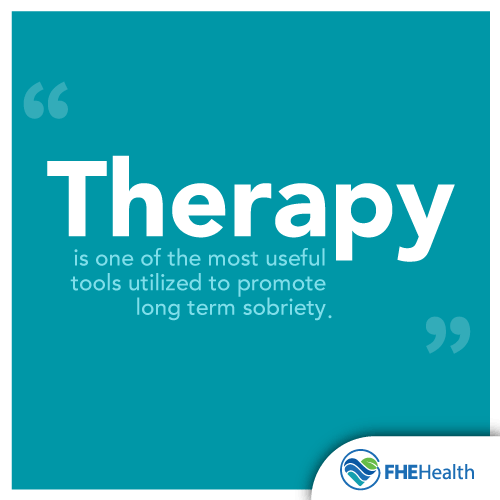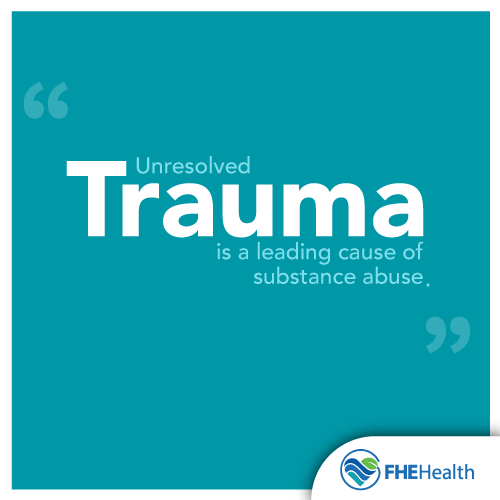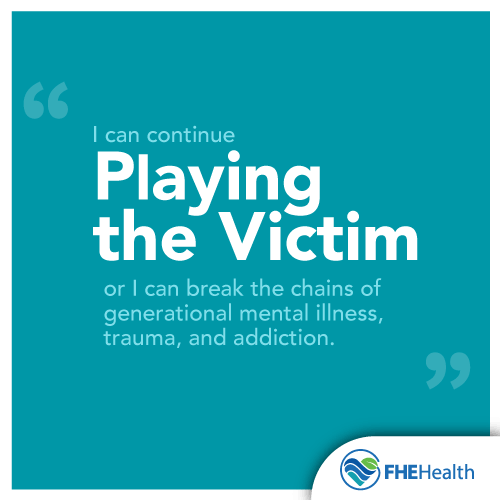
 Most people assume the remedy for recovery involves detox and abstinence from drugs/alcohol. The truth is, this is only the beginning. Recovery is a life-long process, one that requires discipline and most importantly intensive treatment and therapy. Addiction is usually a symptom of an underlying issue such as trauma, abuse, grief, and many other mental health disorders. Interestingly, addiction has been named a “disease of the brain.” This complicated idea suggests that the issue stems from the brain. Complicated and often confusing, this disease attacks the thinking and behaviors of an individual. Therapy is one of the most useful tools utilized to treat trauma and promote long term sobriety.
Most people assume the remedy for recovery involves detox and abstinence from drugs/alcohol. The truth is, this is only the beginning. Recovery is a life-long process, one that requires discipline and most importantly intensive treatment and therapy. Addiction is usually a symptom of an underlying issue such as trauma, abuse, grief, and many other mental health disorders. Interestingly, addiction has been named a “disease of the brain.” This complicated idea suggests that the issue stems from the brain. Complicated and often confusing, this disease attacks the thinking and behaviors of an individual. Therapy is one of the most useful tools utilized to treat trauma and promote long term sobriety.
Need Help?
Treatment can begin quickly and discreetly, get started now
When I first entered treatment, I was thoroughly convinced a 33-day lock-down was the cure. Isolation from people, places, and substances must be the solution. After all, I just needed to leave my hometown, all of the people I was around were bad influences, and without drugs/alcohol in my face, surely, I would stay sober. It was suggested by everyone in treatment that I take full advantage of the mental health therapy offered. My rebellious nature assumed this was just another hyped-up suggestion given by other people who couldn’t possibly understand what was best for me. As always, I approached their therapeutic advice with half measures. I would engage, in therapy, just enough to avoid confrontation but never enough to address the root of my self-propelled misery.
It’s no surprise that this ideology was wholly dismantled, once I stepped into the real world. I wasn’t convinced that abstinent from alcohol, I was still an alcoholic through and through. To my very core, I exhibited all of the ‘isms everyone talked about. I was naturally avoidant, self-seeking, rebellious, self-victimizing, manipulative, dishonest, and I lacked healthy coping skills. I attended intensive outpatient rehab treatment for about 3 weeks before I began taking my will back. I quit attending my IOP sessions and started focusing more on my job, going to the beach with friends, and acquiring new things. Here I was again, sober, still seeking to fill the inside up with temporary outside things.
It wasn’t long before I was acting out on all of the same behaviors, patterns, and misery I had indulged in my whole life. I managed to put together 10 months before I relapsed. Looking back, I can see that I designed the perfect platform for my relapse. I never addressed old traumas, resentments, and the insanity that plagued me. It’s no surprise I chased after the only solution I’d ever known. I was ignorant, and alcohol was there to ease my pain.
Begin your recovery today
Ready to start? More questions about treatment?
I personally experienced trauma at a very young age. I attribute my fundamental inability to cope with the traumatic events of my childhood. Naturally, I began to seek out the same traumas that haunted me my entire life. I was stuck in a cycle that I was convinced I had no part of. I managed to accumulate a year and a half sober, but I was still miserable. The truth is, I was recreating the painful memories of my childhood in sobriety. I had no solution, and I was utterly miserable. It was finally suggested that I take a look at the root of my misery and seek out therapy. The pain eventually became greater than the fear of changing, and I started working with a local trauma therapist.
 Trauma Therapy is a vital form of therapy used for addiction treatment. Recent studies have shown that half of all adults have experienced some form of trauma in their childhood. Unresolved trauma is a leading cause of substance abuse. Addicts turn to drugs/alcohol to self-medicate the pain of PTSD. Therapy as a treatment for Trauma requires the patient to identify the trauma by creating a safe environment for the individual to share painful experiences. Once the patient has identified trauma, the therapist will incorporate tools useful in helping to process, change old belief systems, and promote healing.
Trauma Therapy is a vital form of therapy used for addiction treatment. Recent studies have shown that half of all adults have experienced some form of trauma in their childhood. Unresolved trauma is a leading cause of substance abuse. Addicts turn to drugs/alcohol to self-medicate the pain of PTSD. Therapy as a treatment for Trauma requires the patient to identify the trauma by creating a safe environment for the individual to share painful experiences. Once the patient has identified trauma, the therapist will incorporate tools useful in helping to process, change old belief systems, and promote healing.
More Questions about Treatment?
We offer 100% confidential and individualized treatment
Walking through therapy for PTSD and any other form of trauma treatment can be a tall order. It is essential that the individual feels safe and receives compassionate support from the facilitator. Breaking away from isolation, finding acceptance, and separating trauma from their identity is crucial for the individual. Each experience is unique in nature. It is critical for the individual to feel as if they are in complete control of cultivating their own recovery, as they become more willing to walk towards healing.
 I found a local trauma therapist and I dove in head first. As we began to unravel the chaos of my past, relief followed. My therapist specifically focused on healing the inner child. This method of trauma treatment proved to be the most effective platform for my recovery. My therapist established trust and encouraged vulnerability. We began discussing painful memories I had never shared with another human. Awareness is key. Once I spoke about these things, I was able to process them, and I was able to see everything from an entirely different perspective. I started to connect with the scared little girl that was ruling my thoughts and effortlessly controlling my actions. Relating to my inner child has allowed me to be conscious of old behaviors, I desperately clung to, and has helped me re-establish new, healthy coping skills. Therapy taught me that I, alone, am solely responsible for the life I live today. I can continue playing the victim, or I can break the chains of generational mental illness, trauma, and addiction.
I found a local trauma therapist and I dove in head first. As we began to unravel the chaos of my past, relief followed. My therapist specifically focused on healing the inner child. This method of trauma treatment proved to be the most effective platform for my recovery. My therapist established trust and encouraged vulnerability. We began discussing painful memories I had never shared with another human. Awareness is key. Once I spoke about these things, I was able to process them, and I was able to see everything from an entirely different perspective. I started to connect with the scared little girl that was ruling my thoughts and effortlessly controlling my actions. Relating to my inner child has allowed me to be conscious of old behaviors, I desperately clung to, and has helped me re-establish new, healthy coping skills. Therapy taught me that I, alone, am solely responsible for the life I live today. I can continue playing the victim, or I can break the chains of generational mental illness, trauma, and addiction.
Mental Health Conditions We Treat

ADD & ADHD
A disorder in which individuals display characteristics such as distraction, impulsiveness, hyperactivity and poor attention.
Learn More
Anxiety
Anxiety can be described as the constant feeling of an alarm going off when an individual feels stressed or threatened.
Learn More
Bipolar Disorder
A disorder which causes changes in an individual’s moods, energy levels and prevents the ability to handle day-to-day tasks.
Learn More
Depression
When left untreated, depression can lead to serious long-term effects, such as feelings of loneliness and thoughts of suicide.
Learn More
Eating Disorders
A condition in which an individual displays abnormal eating habits, negatively affecting their mental and physical health.
Learn More
OCD
A mental health disorder in which individuals frequently experience repetitive, obsessive thoughts and compulsive behaviors.
Learn More
Personality Disorder
A personality disorder can significantly disrupt the lives of both the affected person and those who care about that person.
Learn More
PTSD
A disorder that may develop after experiencing or witnessing something traumatic, shocking, scary, or life-threatening.
Learn More
Substance Abuse
Most individuals suffering from substance abuse disorder may want to quit using, but the urges are too strong to control.
Learn MoreI had a session with my therapist and I met every ounce of criteria that mimicked an individual suffering from PTSD. Finally, I became aware, and I had a foundation to cultivate my healing. She suggested we begin with unraveling the webs trauma had weaved into my emotional being. Freedom met me in this place, and I was no longer in shackled to the trauma of my past.
Therapy is not the solution to alcoholism, however actively participating in therapy has had an overwhelmingly positive impact on my recovery. Throughout almost 20 years, I created a multitude of defense mechanisms. I soon learned that these psychological walls were contributing to my demise. I became a victim of my past, I felt as if I was still living in my childhood consumed with trauma and chaos. I do not look to therapy as a replacement for the solution I found in the 12 Steps of AA, but rather an asset that has continued to enhance my overall quality of life. The beauty of valiantly cleaning up the wreckage of our past is freedom from the bondage of self.
Start Treatment Now
Treatment can begin quickly and discretely, get started now
About Tricia Moceo
Tricia Moceo is a content writer, SEO specialist, and content manager. She was born and raised in a small town, just south of Atlanta, Georgia before moving to South Florida... read more






